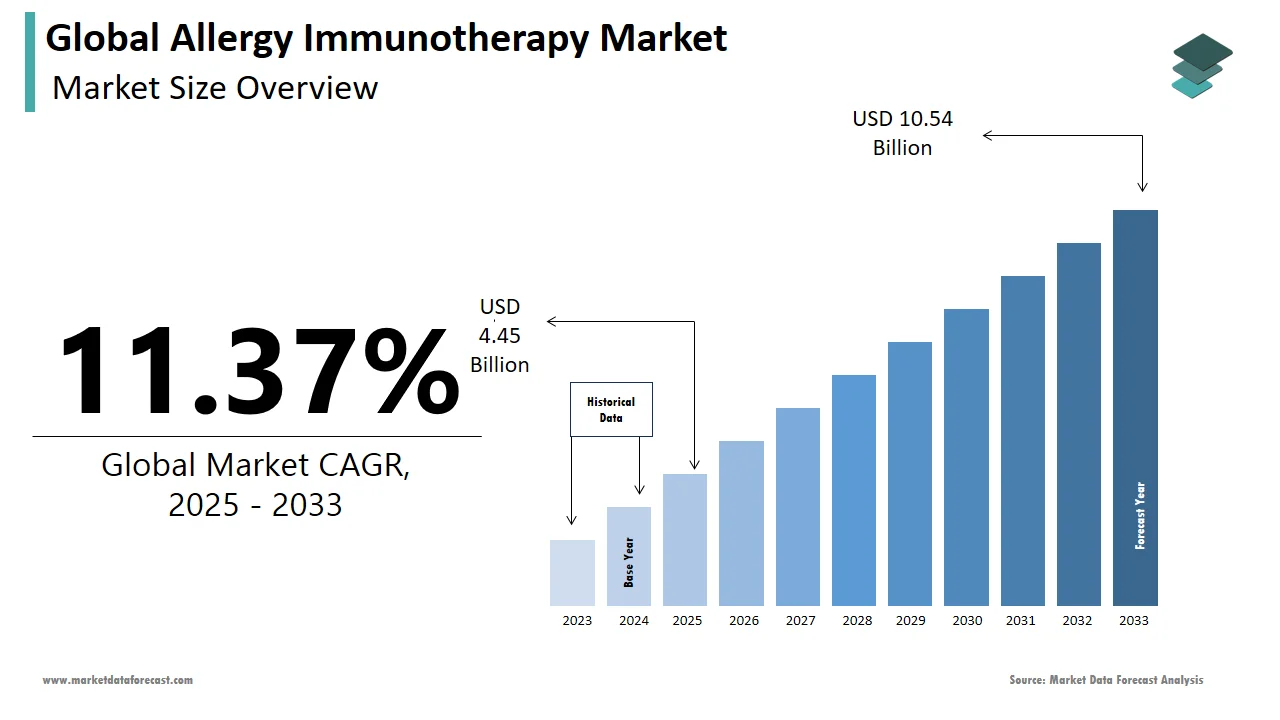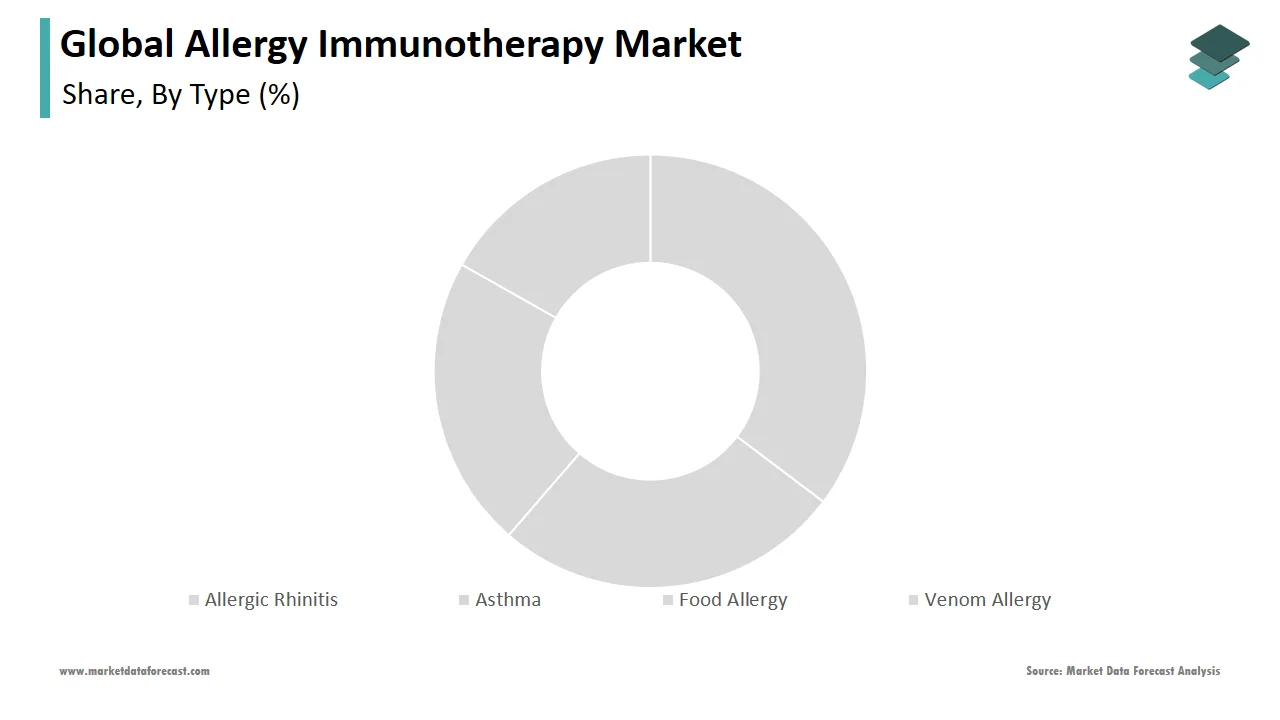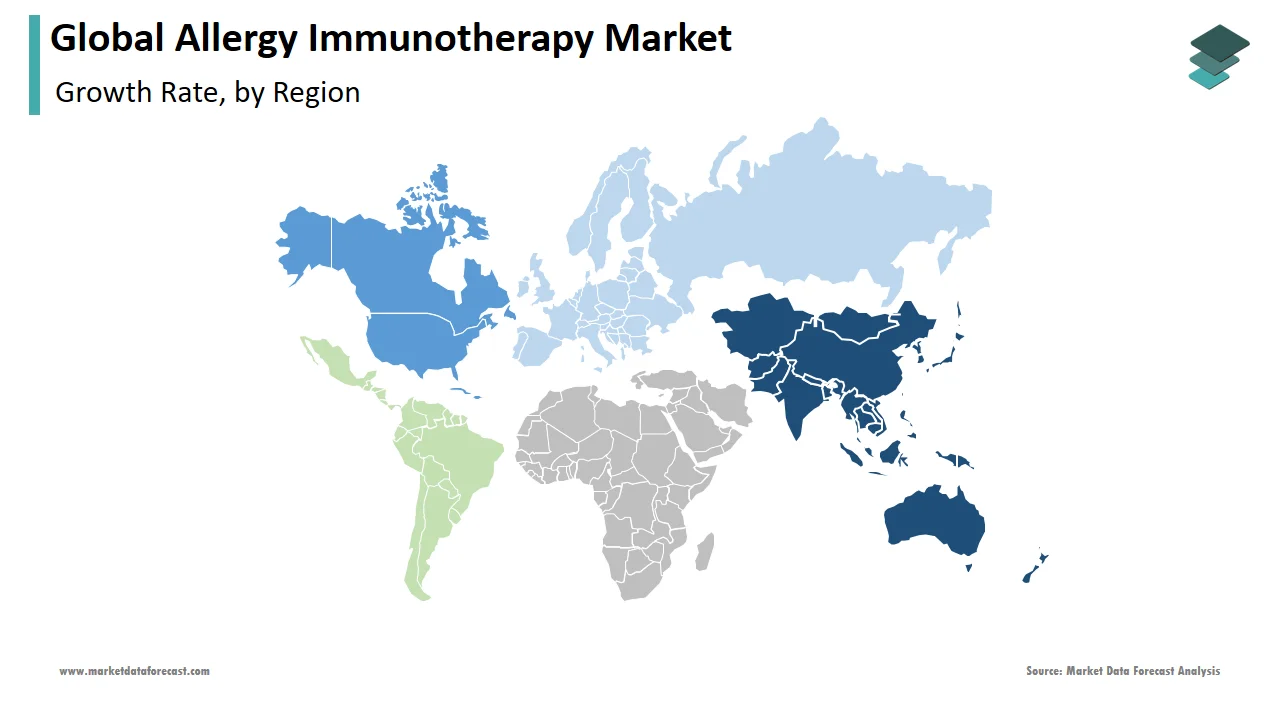Global Allergy Immunotherapy Market Size, Share, Trends & Growth Forecast Report By Treatment, Type, End-User and Region (North America, Europe, Asia-Pacific, Latin America, Middle East and Africa), Industry Analysis From 2025 To 2033.
Global Allergy Immunotherapy Market Size
The size of the global allergy immunotherapy market was worth USD 4 billion in 2024. The global market is anticipated to grow at a CAGR of 11.37% from 2025 to 2033 and be worth USD 10.54 billion by 2033 from USD 4.45 billion in 2025.

Allergy immunotherapy, also known as desensitization or hypo-sensitization, is a medical treatment that prevents allergic reactions to allergens such as foods, medications, bee venom, grass pollens, and home dust mites. It modifies the immune system's response by progressively increasing allergen dosages. An allergist and the patient examine triggering factors for allergy symptoms before starting therapy, including skin and blood testing to confirm the allergens. Allergy immunotherapy reduces inflammation, has a long-term effect, improves immunological tolerance, alters the course of the disease, and enhances the patient's quality of life.
MARKET DRIVERS
Allergies are becoming more common worldwide due to various environmental and lifestyle factors influencing immune system function.
As people become more aware of allergy immunotherapies, their income levels rise, their healthcare spending increases and the need for advanced and long-term treatment choices rises, boosting the market's growth. It is also bolstered by increased clinical research and development budgets due to several initiatives done by governmental and non-governmental organizations worldwide. Furthermore, increased air pollution, both indoors and outdoors, has increased the prevalence of asthma and allergic respiratory illnesses.The use of oral immunotherapy to treat allergic rhinitis has become increasingly common in the healthcare industry to treat unintentional allergies. The overall market is benefiting from increased awareness of these treatments' availability. Pharmaceutical companies have also developed more effective immunotherapies for treating various allergies using the most up-to-date medication development technology. The expected increase in income can be linked to the increased prevalence and burden of allergy disorders worldwide. The composition of allergy shots given to patients to enhance their immune systems has improved due to technological advancements in bioengineering and immunology. In addition, initiatives to address issues such as immunotherapy's safety, efficacy, standardization, prices, and lengthy duration are projected to drive market expansion in the next few years.
MARKET RESTRAINTS
The high expense of treatment limits therapy uptake and stifles overall progress, and reluctance among people has been fueled by side effects such as gastrointestinal problems and skin ailments. In addition, a lack of competent specialists and unawareness is a challenge to the entire market's growth.
REPORT COVERAGE
|
REPORT METRIC |
DETAILS |
|
Market Size Available |
2024 to 2033 |
|
Base Year |
2024 |
|
Forecast Period |
2025 to 2033 |
|
CAGR |
11.37% |
|
Segments Covered |
By Type, Treatment, End-User, and Region. |
|
Various Analyses Covered |
Global, Regional, and country-level analysis; Segment-Level Analysis, DROC; PESTLE Analysis; Porter’s Five Forces Analysis, Competitive Landscape; Analyst Overview of Investment Opportunities |
|
Regions Covered |
North America, Europe, APAC, Latin America, Middle East & Africa |
|
Market Leaders Profiled |
ASIT Biotech, Circassia, Mylan N.V., Adamis Pharmaceuticals Corporation, Merck KGaA, Stallergenes Greer PLC, Allergy Therapeutics, ALK-Abelló A/S, DESENTUM OY, HAL Allergy B.V., HollisterStier Allergy, LETIPharma, and DBV Technologies SA., and Others. |
SEGMENTAL ANALYSIS
By Type Insights

During the forecast period, the allergic rhinitis segment is expected to grow the fastest among all the segments. The increasing rate of this type of allergy throughout all age groups is one of the causes ascribed to the segment's growth.
By Treatment Insights
The segment by immunotherapy type predicted to hold the largest market share is subcutaneous immunotherapy (SCIT). This is because the most widely used and most effective allergy immunotherapy is subcutaneous immunotherapy (SCIT), the only treatment that modifies the immune system, preventing the development of new allergies and asthma. Therefore, immunotherapy's increasing acceptance is a crucial element driving the market's rise.
By End-User Insights
Based on the end-user, the hospital pharmacy segment is predicted to rise at a healthy CAGR owing to an expanded patient pool and easy access to allergy shots at these facilities. Furthermore, the increased adoption of this procedure in government and semi-government institutions and reimbursements and supportive regulations will contribute to the market's growth.
REGIONAL ANALYSIS
Asia-Pacific is expected to hold the highest global allergy immunotherapy market share during the forecast period.
Air pollution in China and India has improved due to increased government investments and trade for research and development, an increase in the number of individuals suffering from allergies, and industrialization and infrastructure development. Allergic rhinitis is one of China's most frequent allergens, and its prevalence has risen dramatically over the last two decades. According to experts, the fundamental causes behind the unexpected rise in allergic rhinitis are changing environmental factors, cleanliness and infection control advancements, and increased cases of hereditary complications in the allergy immunotherapy market.
Due to the rising frequency of food allergies, the global allergy immunotherapy market in North America is predicted to rise rapidly over the forecast period. The United States is expected to be the largest allergy immunotherapy market worldwide. The high prevalence of allergies in the United States and strict regulatory rules that require allergic testing in all cases of intensive and emergency care are driving the expansion of the allergy immunotherapy market in the United States.
Because of the strong presence of some top industry players, Europe is expected to take a substantial share of the global allergy immunotherapy market through 2027. A considerable patient population in the region suffers from allergic rhinitis, asthma, and chronic food allergies. Furthermore, increasing allergy drug approvals will propel the market forward even faster.
KEY MARKET PLAYERS
Companies playing a vital role in the global allergy immunotherapy market profiled in this report are ASIT Biotech, Circassia, Mylan N.V., Adamis Pharmaceuticals Corporation, Merck KGaA, Stallergenes Greer PLC, Allergy Therapeutics, ALK-Abelló A/S, DESENTUM OY, HAL Allergy B.V., HollisterStier Allergy, LETIPharma, and DBV Technologies SA.
RECENT MARKET DEVELOPMENTS
- In 2020, Health Canada approved once-daily ITULATEKTM to treat tree pollen allergy, according to ALK, a global, research-driven pharmaceutical business focused on preventing, diagnosing, and treating allergies.
- Aptar Pharma, a global leader in drug delivery systems, services, and active material science solutions, announced an exclusive collaboration with Stallergenes Greer, a global healthcare company specializing in allergen immunotherapy (AIT), to develop the first-of-its-kind connected drug delivery device and companion mobile app for patients receiving Stallergenes Greer's sublingual AIT treatments.
MARKET SEGMENTATION
This report on the global allergy immunotherapy market has been segmented and sub-segmented into type, treatment, end-user, and region.
By Type
- Allergic Rhinitis
- Asthma
- Food Allergy
- Venom Allergy
By Treatment
- Subcutaneous Immunotherapy (SCIT)
- Sublingual Immunotherapy (SLIT)
By End-User
- Hospital Pharmacy
- Retail Pharmacy
- Online Pharmacy
By Region
- North America
- Europe
- Asia-Pacific
- Latin America
- Middle East and Africa
Related Reports
Access the study in MULTIPLE FORMATS
Purchase options starting from $ 2500
Didn’t find what you’re looking for?
TALK TO OUR ANALYST TEAM
Need something within your budget?
NO WORRIES! WE GOT YOU COVERED!
Call us on: +1 888 702 9696 (U.S Toll Free)
Write to us: sales@marketdataforecast.com

